Related Research Articles

Sylvano Bussotti was an Italian composer of contemporary classical music, also a painter, set and costume designer, opera director and manager, writer and academic teacher. His compositions employ graphic notation, which has often created special problems of interpretation. He was known as a composer for the stage. His first opera was La Passion selon Sade, premiered in Palermo in 1965. Later operas and ballets were premiered at the Teatro Comunale di Firenze, Teatro Lirico di Milano, Teatro Regio di Torino and Piccola Scala di Milano, among others. He was artistic director of La Fenice in Venice, the Puccini Festival and the music section of the Venice Biennale. He taught internationally, for a decade at the Fiesole School of Music. He is regarded as a leading composer of Italy's avantgarde, and a Renaissance man with many talents who combined the arts expressively.
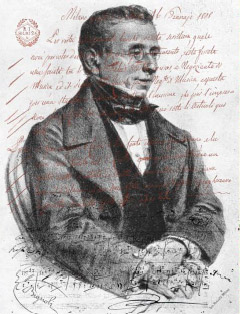
Casa Ricordi is a publisher of primarily classical music and opera. Its classical repertoire represents one of the important sources in the world through its publishing of the work of the major 19th-century Italian composers such as Gioachino Rossini, Gaetano Donizetti, Vincenzo Bellini, Giuseppe Verdi, and, later in the century, Giacomo Puccini, composers with whom one or another of the Ricordi family came into close contact.

The Messa per Rossini is a Requiem Mass composed to commemorate the first anniversary of Gioachino Rossini's death. It was a collaboration among 13 Italian composers, initiated by Giuseppe Verdi. The composition was intended to be performed on 13 November 1869 in the Basilica of San Petronio, Bologna, where Rossini grew up and spent a large part of his life.

Gianluigi Gelmetti OMRI, was an Italian-Monégasque conductor and composer.
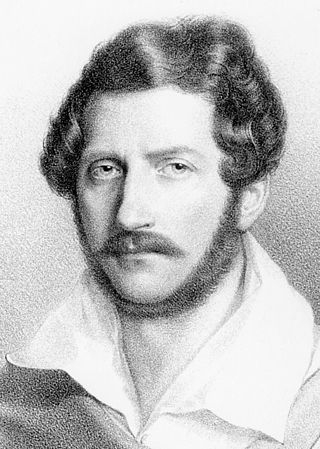
Gianni di Parigi is an 1839 melodramma comico in two acts with music by Gaetano Donizetti to a libretto by Felice Romani, which had previously been set by Francesco Morlacchi in 1818 and by Giovanni Antonio Speranza in 1836.

Lorenzo Ferrero is an Italian composer, librettist, author, and book editor. He started composing at an early age and has written over a hundred compositions thus far, including twelve operas, three ballets, and numerous orchestral, chamber music, solo instrumental, and vocal works. His musical idiom is characterized by eclecticism, stylistic versatility, and a neo-tonal language.
Marco Lazzara is an Italian countertenor who sings a wide-ranging repertoire from baroque composers to those of the 20th century and has performed in a number of notable premieres and revivals of rarely performed operas. He has recorded widely on the Bongiovanni, Ricordi, Nuova Era, Forlane, Opera Rara and Dynamic labels.
Sergio Rendine was an Italian composer of operas, ballets, symphonies, cantatas and chamber music. He worked as a lecturer at the Conservatorio Alfredo Casella, for the Accademia Nazionale di Santa Cecilia, and for SIAE. He was artistic director of the Teatro Marrucino in Chieti from 1997 to 2007. He received awards for Alice, a "radiophonic opera". His opera Un segreto d'importanza was premiered by the Opéra de Monte-Carlo. His Missa de beatificatione in onore di Padre Pio da Pietrelcina, a mass written for the beatification of Pio of Pietrelcina, was premiered in 1999 in Vatican City, with José Carreras as a soloist. His oratorio Passio et Ressurrectio was recorded live and broadcast from the cathedral in Chieti premiere, and his two symphonies were recorded by Chandos Records.
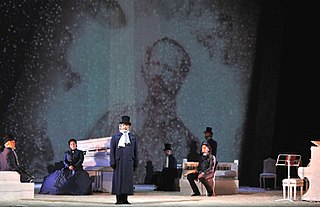
Risorgimento! is an opera in one act by Lorenzo Ferrero set to an Italian-language libretto by Dario Oliveri, based on a scenario by the composer. It was completed in 2010 and first performed at the Teatro Comunale Modena on 26 March 2011.
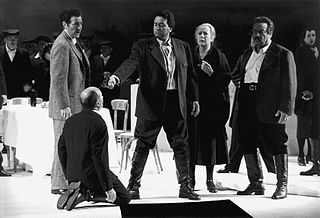
Salvatore Giuliano is an opera in one act by Lorenzo Ferrero to an Italian-language libretto by Giuseppe Di Leva, which was conceived to be performed in tandem with Pietro Mascagni's Cavalleria rusticana. The work was commissioned by the Teatro dell'Opera di Roma and premiered there on 25 January 1986.

Alessandro Sanquirico was an Italian scenic designer, architect, and painter. He began his career in conjunction with leading artists of the time such as Paolo Landriani, Giovanni Pedroni, Giovanni Perego, and Georgio Fuentes. Additionally, he studied architecture and perspective with Giuseppe Piermarini, the architect of the La Scala opera house.
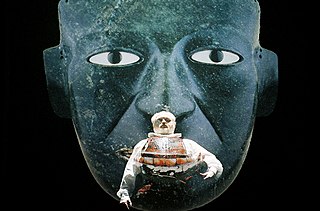
La Conquista is an opera in two acts by Lorenzo Ferrero set to a trilingual libretto by the composer and Frances Karttunen, based on a concept by Alessandro Baricco. It depicts the major episodes of the Spanish conquest of the Aztec Empire in 1521 and the subsequent destruction of the Aztec civilization. The libretto (English-Spanish-Nahuatl) is a blend of historical and literary sources drawn from transcriptions of indigenous and European literature, both kept, with some exceptions, in their original languages. The texts are taken from The Truthful History of the Conquest of New Spain by Bernal Díaz del Castillo, the Book XII of the Florentine Codex, the works of Juan Boscán Almogáver, Bernardino de Sahagún, Lope de Vega, Heinrich Heine, and from Aztec prayers, songs and poems as collected in Cantares Mexicanos and Romances de los señores de Nueva España.
Charlotte Corday is an opera in three acts by Lorenzo Ferrero to an Italian-language libretto by Giuseppe Di Leva, written on commission from the Teatro dell'Opera di Roma for the 200th anniversary of the French Revolution which was commemorated in 1989.
Giampaolo Coral was an Italian composer.
La figlia del mago is a children's opera in two acts by Lorenzo Ferrero set to an Italian-language libretto by Marco Ravasini. It was completed in 1981 and subtitled giocodramma melodioso, a wordplay on melodramma giocoso. The libretto, inspired by Mario Lavagetto's 1979 book Quei più modesti romanzi: il libretto nel melodramma di Verdi, is written in an imaginary language which emphasises the element of play. The music is a sequence of closed numbers "which spoof the most common operatic conventions." The aim of the opera is to show children how Italian opera functions. Alongside professional singers, children take mime roles.
Marilyn: Scenes from the '50s in two acts, is an opera by Lorenzo Ferrero set to a bilingual libretto by Floriana Bossi and the composer. The text consists of a collection of fragments taken from original political, social and cultural documents and has two different linguistic levels: English for the sung parts, and the language of the country in which the performance takes place for the spoken parts.
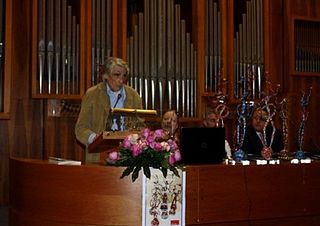
Rodolfo Tommasi was an Italian journalist, writer, and musical and literary critic.
Le piccole storie, subtitled Ai margini delle guerre, is a one-act chamber opera for young people by Lorenzo Ferrero set to an Italian-language libretto by Giuseppe Di Leva. Some episodes are loosely based on Guy de Maupassant's 1884 short story "Le Lit 29" and on William Shakespeare's play Julius Caesar. The stories do not touch directly upon the subject of war but depict moments in the lives of involuntary victims who subsist, as the subtitle suggests, on the margins of wars.

La Nueva España is a set of six symphonic poems by Lorenzo Ferrero written between 1990 and 1999, which is dedicated to the Spanish conquest of Mexico in 1519–21. The suite can be considered a kind of preparatory study to the opera La Conquista. This story—says the composer—is of great relevance and reminds us that cultural diversity is a precious asset that must not be squandered.

Amelia Felle is an Italian operatic soprano and voice teacher. Born in Bari, she has been active on the stages of Italian and European opera houses and concert halls since her debut in 1981. She holds the chair in vocal chamber music at the Conservatorio di Santa Cecilia in Rome, a position she previously held at the Conservatorio Tito Schipa in Lecce.
References
Notes
- ↑ Holden, p. 274.
- ↑ "Casa Ricordi catalogue".
- ↑ "Amazon website". Amazon UK.
Sources
- Bagnoli, Giorgio, ed. (1993). The La Scala Encyclopedia of the Opera. New York: Simon & Schuster. ISBN 0-671-87042-4
- Dorsi, Fabrizio and Giuseppe Rausa (2000). Storia dell'opera italiana. Paravia Bruno Mondadori Editori. ISBN 88-424-9408-9
- Fearn, Raymond (1998). Italian Opera since 1945. London: Routledge. ISBN 90-5755-001-6
- Gelli, Piero, ed. (2007). Dizionario dell'Opera 2008 entry: "Lorenzo Ferrero". Milano: Baldini Castoldi Dalai editore. ISBN 978-88-6073-184-5
- Holden, Amanda, ed. (2001). The New Penguin Opera Guide. London: Penguin Books. ISBN 0-14-051475-9
- Iesuè, Alberto (1988). Storia della musica. Padova: Franco Muzzio & C editore spa. ISBN 88-7021-449-4
- Sadie, Stanley, ed. (1992–2002). The New Grove Dictionary of Opera . London: Macmillan Publishers. ISBN 0-19-522186-9
- Webb, Michael D. (2008). Italian 20th Century Music: The Quest for Modernity. London: Kahn & Averill. ISBN 978-187108289-0.